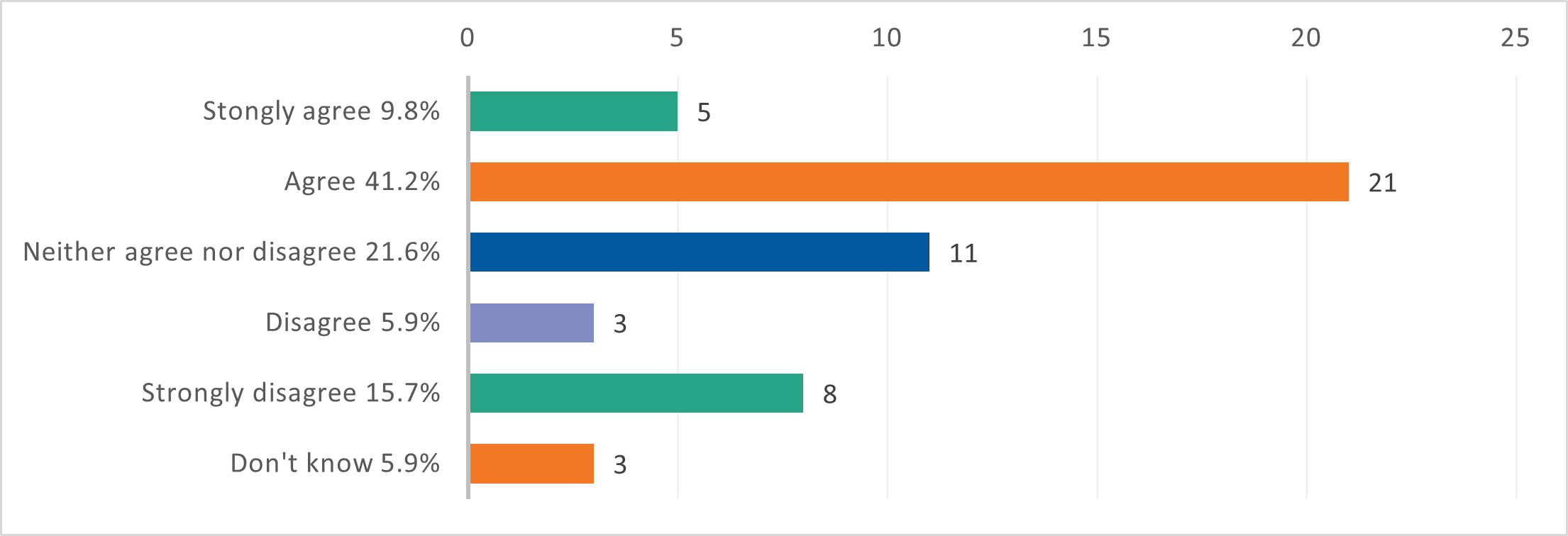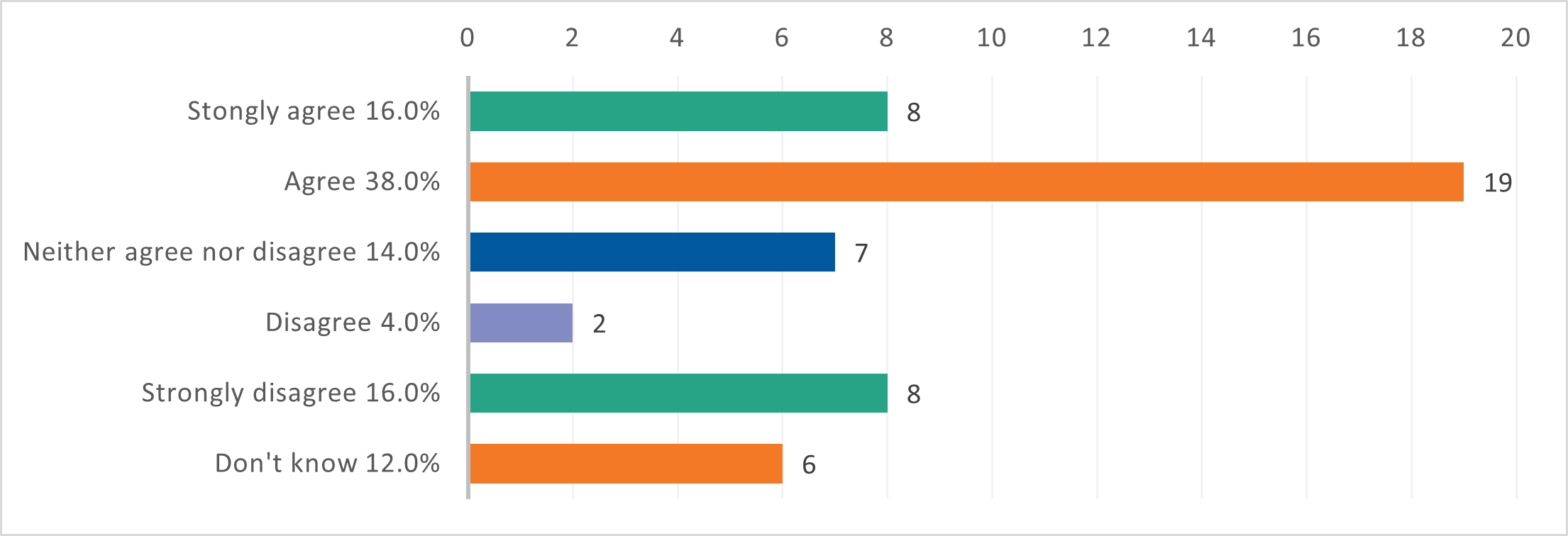Findings
Statutory consultee responses
We received six responses from the following statutory consultees:
- North East Lincolnshire Council
- South Kesteven District Council
- South and East Lincolnshire Councils Partnership (comprising Boston Borough Council, East Lindsey District Council and South Holland District Council)
- Greater Lincolnshire Local Enterprise Partnership
- Chief Constable of Lincolnshire Police
- Transport Focus
Summary of the points raised by statutory consultees in relation to the Enhanced Partnership Scheme and Plan
- Responses to the Scheme and Plan were mostly positive and complimentary.
- LCC not getting additional funding will moderate ambitions.
- Proposed bus infrastructure, bus priority and junction priority measures are supported.
- LCC should ask for the views of passenger groups to ensure the Scheme and Plan are meeting the needs of users.
- Some large housing developments are not identified within the list of new developments in the plan.
- The focus on travelling safely was welcomed, including the ambition to have Wi-Fi and CCTV on all buses.
- Having more bus lanes would help to reduce congestion and increase road safety.
- Services cannot be relied upon to access time-critical services, such as trains.
- Realtime information would be a significant help for bus users.
- Consideration will need to be given to bus services which cross local authority boundaries.
- More needs to be done to help strengthen CallConnect availability. This includes in the early mornings, late evenings and on Sundays.
- Increasing the frequency and operating hours of CallConnect, Inter Connect and Into Town services was welcomed.
- Bus operators can do more to encourage off bus payments to improve efficiency and shorten journey times.
- The focus on the market town improve programme and bus driver training was welcomed.
- Request for a service from Bourne to Grantham and Lincoln.
- There is a wish to explore with LCC how Plusbus could be expanded across other towns, including Boston and Spalding.
- Stamford should be part of the Plusbus scheme and also be part of the Market Towns Improvement Programme.
- Not enough evening and weekend services to be useful in and around Grantham.
- The proposed Market Town Improvement Plan is supported.
- It was welcomed that Grantham is one of the market towns identified for the Market Towns Improvement Programme.
- LCC should embrace innovation and explore potential improvements and ideas to help achieve Net Zero targets by 2040 in Lincolnshire.
Summary of the questions raised by statutory consultees in relation to the Enhanced Partnership Scheme and Plan
- How will LCC report on progress towards meeting targets?
- How does LCC plan to publicise the passenger charter?
- Could more be done to support pilot schemes for purchasing new buses linked to NET Zero targets and emerging fuel types?
- Could we look more closely at making the case for housing developers contributing to new bus provision where new housing is planned?
- Could we explore supporting operators to invest in new vehicles to drive down costs and fares?
- What rationale was used to select the three towns for the Market Towns Improvement Programme?
Non-statutory consultee responses
We received 51 responses to the online consultation survey on Let’s talk Lincolnshire.

Who took part:
- 44 people (86.3%) were a member of the public
- 5 people (9.8%) were representing an organisation
- 2 people (3.9%) chose 'other'
The five ‘representing an organisation’ responses were from:
- A village residents’ association
- Two parish councils
- A councils partnership (this response has been included in the statutory consultees section of this report)
The two ‘other’ responses were from councillors.
We asked, "to what extent do you or your organisation agree or disagree that the Enhanced Partnership Scheme and Plan reflects the current situation and identifies the optimal solutions for improving bus services in Lincolnshire?"

- 26 people (51.0%) agreed or strongly agreed
- 11 (21.6%) disagreed or strongly disagreed
We asked, "if Lincolnshire was successful in acquiring any future funding, to what extent do you or does your organisation agree or disagree with the priorities identified in Annex B of the Enhanced Partnership Scheme?"

- 27 people (54%) agreed or strongly agreed
- 14 people (28%) disagreed or strongly disagreed
We asked people if they had any other comments. The next section, General comments, summarises the comments received.
General comments
People mentioned the need for:
- Long term, imaginative and creative solutions to bus services based on current circumstances, not on pre pandemic circumstances.
- Long term funding commitments.
- Clean, more affordable, frequent, regular and reliable services to attract more users.
- People to use buses rather than cars with better services between big towns.
- Economical and environmentally friendly buses.
- Areas with the greatest housing growth to be prioritised for bus services.
- Areas with fewest or no bus services to be prioritised ahead of well-connected areas.
- Greater publicity of bus services and changes to bus services.
- Timetables to be better thought out, publicised and changed less often.
- Improved bus stops and shelters, with displays of current timing information for arrivals and departures.
- Increased security cameras for public and bus staff safety.
- Passenger numbers to be prioritised over shorter journey times.
- Joined up services between different bus operators and across neighbouring council areas.
- Services joined up with other public transport, such as rail services.
- More scheduled services rather than Call Connect services.
- National Express service to be reinstated and more coach operators to pick up in villages.
- Using cash on buses.
- Future engagement to focus on bus users and involve greater partnership between parish and county councils.
Specific comments about why services are needed
People mentioned the need for:
- More services allowing people to commute to work, with services starting earlier and ending later in the day.
- Services giving easier access to public services such as medical appointments at centralised medical centres.
- More services connecting people with schools, colleges and learning opportunities.
- Services which make it easier to travel for shopping.
- Services for better access to leisure and sporting opportunities. More services in the evenings, late night and at weekends, including Sundays. These services are especially important for younger people.
Several people raised points about rural isolation and villages
People mentioned the need for:
- More services to and from smaller towns, villages and isolated rural locations, including CallConnect services.
- Services to run earlier and later from villages to towns and back to enable travel to and from work.
- Extending hours of services from villages to towns to make travel worthwhile (some services allow only a limited time in the destination before the return bus service).
- Services to enable an ageing population to access shopping in non-village locations (especially where village shops have closed down).
- Smaller more economic buses to serve small towns and villages.
Next steps
The results of this consultation will be shared with Lincolnshire County Council Transport team. It will also be shared with Lincolnshire County Council councillors and the Council’s Highways and Transport Scrutiny Committee. The consultation engagement report will be published and made available for the public on Let’s talk Lincolnshire. The report was shared and published in April 2023.
